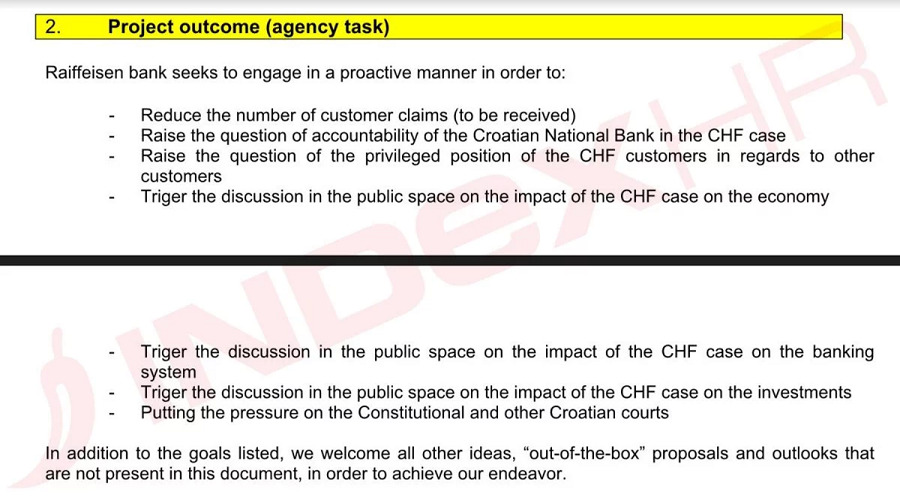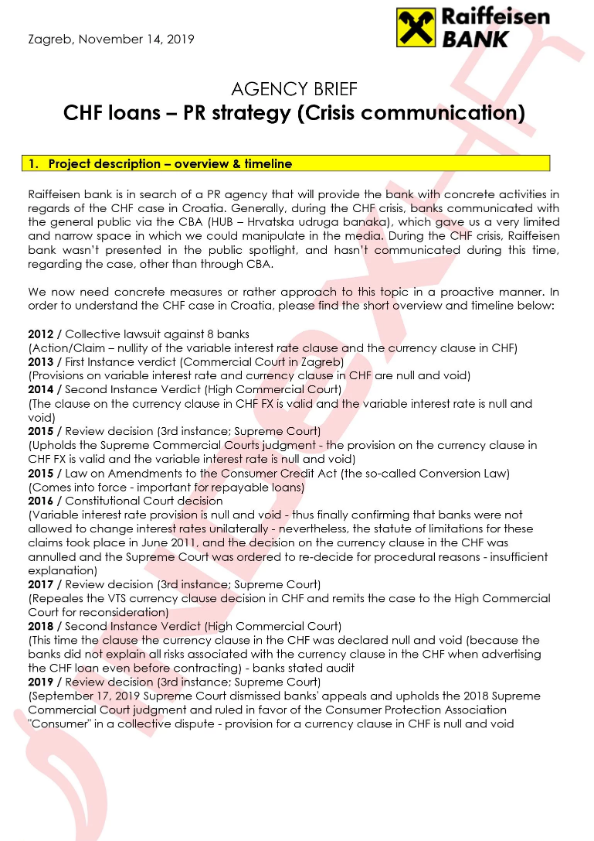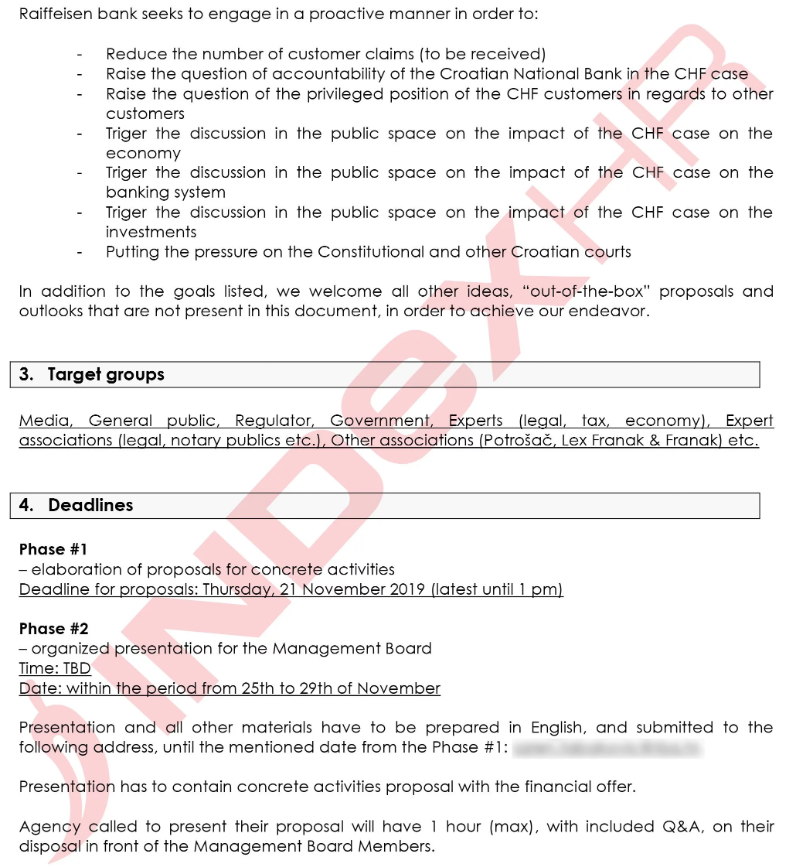RBA Bank CEO Michael Müller Quits After Tender to Pressure Judiciary
As Index writes on the 22nd of January, 2020, the chairman of the board of Raiffeisen Bank (RBA) resigned after the uncovering of an affair originally announced on Index Investigations/Index Istrage. As Index found out, RBA was seeking a PR agency to put pressure on the Constitutional Court and other Croatian courts, which is illegal.
Michael Müller has now resigned as CEO of RBA, regarding the negative public perception of the invitation to the controversial PR agency tender. RBA issued a press release:
Raiffeisenbank Austria d.d.: Michael Müller resigns as CEO
Today, Michael Müller resigned as CEO of Raiffeisenbank Austria d.d. on his own request following negative media coverage regarding a briefing document for Public Relations agencies.
“I acknowledge the strong negative sentiment towards Raiffeisenbank Austria and its management. However, the briefing in no way reflects the intention of RBA’s management. As a professional manager I decided to step down to prevent further reputational damage for the bank,” Michael Müller said.“
I accepted Michael Müller’s resignation as a sign of his responsible attitude and would like to thank him for his long-time service with Raiffeisenbank Austria and the RBI Group. Both RBI and Raiffeisenbank Austria stand for lawfulness, high ethical standards and trust,” said Andreas Gschwenter, President of Raiffeisenbank Austria’s Supervisory Board and Member of the Management Board of the bank’s parent company Raiffeisen Bank International (RBI).
Liana Keserić, a very experienced member of the management team of RBA, will act as interim CEO subject to the approval of the authorities.
The media investigation which led to Müller's resignation is translated in full below:
As Istrage/Ilko Cimic/Index writes on the 19th of January, 2020, for the selection of a PR agency by Raiffeisen Bank (RBA), in which the aforementioned bank sought crisis communication services over the Swiss loan case, one of the desired agency's tasks was to "exert pressure on the Constitutional and other courts in Croatia". Quite literally.
Under Croatian and international law, any pressure on the judiciary, that is, on judges, is strictly prohibited, and the European Court of Human Rights has already overturned Croatian judgments on suspicion of pressure from both the public and interested parties.
Although the letter/call, which is written in English, says to ''put pressure on the Constitutional and other Croatian courts", in its statement to Index, RBA claimed that "solely solutions containing legitimate actions" were sought.
Attorney Nicole Kwiatkowski, the co-author of a collective lawsuit against eight banks in the Swiss case, said it was an inadmissible practice that could have an impact on the final judgment. Goran Aleksic, a SNAGA member of parliament and an activist of the Franak Association, claims that it is an illegal attack on an independent judiciary and clear evidence that Croatian banks are not afraid of anyone.
But let's not get ahead of ourselves just yet.
How did it all begin?
Last September, an important verdict was passed by the Supreme Court, which ruled that the banks had violated the collective interests and rights of credit users contracted in Swiss francs. According to this ruling, all eight Croatian banks were found guilty of unlawful and dishonest treatment. It is a final judgment after which debtors can claim repayment of the overpaid loans in Swiss francs, but in individual court proceedings.
The banks were left to address the Constitutional Court and possibly initiate proceedings at the European level. Additionally, a judgment of the Supreme Court is now awaited, which has yet to decide whether a contract with a currency clause in Swiss francs is void.
In the middle of November last year (more precisely November the 17th, 2019), RBA sent some PR agencies a tender, ie, a call for selection, a so-called pitch, in which they sought out crisis communication services. RBA's main agenda was to reduce the number of appeals, to open up the issue of the Croatian National Bank's liability in the Swiss case, to launch a debate in the public space on the impact of the Swiss case on the economy, and more.
At the bottom is a request to put pressure on the Constitutional Court and other courts in Croatia (Literally, and in English: Putting pressure on the Constitutional and other Croatian courts). RBA hasn't denied that it sent the call out to PR agencies.
RBA stated that they wanted a PR agency to provide them with better visibility in the media.
"In view of the current topic of the Swiss franc loans, RBA decided to call for a PR agency in order to promote the views of the bank in the public and media space,'' they say from RBA in response to an Index inquiry.
What is of particular interest is the way in which the Croatian judiciary, ie the Croatian courts, were supposed to be put under pressure, which is explicitly mentioned in the call to the PR agencies in English. Keep in mind that influencing courts or the judiciary in Croatia is completely and utterly illegal.
RBA claims that only solutions containing ''legitimate practices'' were sought.
"RBA adheres to all of the laws and regulations of the Republic of Croatia in its business operations, including the case for the tender you're referring to. Only solutions containing legitimate procedures and communication activities that would reach the public through the media were sought," RBA told Index.
Following that answer, Index asked what these legitimate procedures for pressuring the Constitutional Court and other courts in Croatia would be, and whether these legitimate procedures were established by law, given that RBA was urged to "comply with all of the laws and regulations of the Republic of Croatia". Index asked them what specific regulations or laws they were referring to in this case.
"RBA is not engaged in any of the activities that you're suggesting. The tender sought the service of developing a communication strategy and key messages," RBA responded, adding that no agency was selected for these type of activities.
Kwiatkowski claims that this is inadmissible and illegal.
Lawyer Nicole Kwiatkowski was surprised when Index asked her for comments on RBA's tender.
"Any pressure on the courts is unacceptable on any side. Such behaviour is completely inappropriate. Croatian and European case law is full of examples of the rescission of judgments and the reopening of court pressure proceedings,'' Kwiatkowski told Index, adding that there were various options for so-called lobbying in an appropriate manner, from organising public hearings and engaging the professional public, but any pressure is totally unacceptable.
"All of this surprises me. Okay, we expect heightened media coverage, literacy tributes and some action, but something like this... no. I'd like to say that this is happening at a time when we have a final judgment of the Supreme Court where users of these loans are allowed to claim compensation through individual cases, which is an extremely important point. I emphasise that any pressure is unacceptable and illegal,'' says lawyer Nicole Kwiatkowski.
Index then asked Goran Aleksic, an MP for SNAGA and an activist of the Franak Association, if he had any knowledge that the banks had been pressuring the courts.
"Banks have been doing this sophisticatedly for a very long time. They do it primarily through ''their'' journalists in ''their'' media, but also through ''their'' law professors. I will not say what kind of media this is, but I will say how it works.
Each time something with franc case was dealt with, spins would start in some media, which could be summarised in the following statements: ''What do they want, they were greedy and now they complain; they were economically illiterate; they made fun of those of us who raised euro loans; now they're acting stupid as if they don't know that currency can grow on the exchange rate; the banks are not guilty, variable interest and currency clauses are allowed,'' and the like," explains Aleksic.
"If pressure is being exerted directly on the judges, I can't really say, but I suppose that e-mails are sent to the judges with certain ''expert'' papers from some ''experts'' who agitate for banks. The last example of ''expert'' agitation is the case of Professors Petrovic and Jaksic, who publicly stand in favour of banks, claiming that debtors with converted loans have nothing more to seek because they've been indemnified, and Professor Petrovic even writes expert opinions on bank defense filings in the courts. But, I have to say that I believe in the independence of the judiciary, and I believe that a large proportion of judges will not be affected by such spins,'' says Aleksic, noting that the vast majority of first-instance judgments for converted loans are for the benefit of the consumers, and many judges correctly understood the judgment of the EU Court of Justice C-118/17.
Aleksic says that it is difficult for him to be surprised by anything when it comes to banks, even the idea of them trying to put pressure on the Constitutional Court and other Croatian courts.
"The banks no longer surprise me. The concrete formulation you mention is unmistakable - it calls for pressure on the Constitutional Court and other courts to release banks from liability and blame. This is an attack on an independent judiciary, and an illegal attack. I'm amazed that they've formulated such wording in their official document, and if it is official, the banks don't appear to be afraid of anybody. The Croatian National Bank, the Government of the Republic of Croatia and the Croatian Parliament are to blame for such actions,'' says Aleksic.
"For now, the state is doing nothing about it, the banks are still acting as if they've not been convicted at all, they're still lying about how their business was in line with the law, and at the same time they're asking the state for damages in Washington. The banks are the holy cow for the Croatian National Bank and the Government of the Republic of Croatia. This is a national embarrassment. The courts remain the last line of defense against thieves and I believe that in the first half of 2020 all remaining legal dilemmas will be resolved in the franc case, after which I hope for the general mobilisation of all robbed citizens towards the courts with the aim of being repaid, all together the banks need to return around 25 billion kuna of stolen interest and stolen Swiss franc growth. Minister Darko Horvat announced the strengthening of consumer protection as part of the presidency of the EU Council, so we'll see if he's serious, or if it's just a cosmetic statement because of the EU Commission, which truly advocates for consumer rights,'' Aleksic concludes.
The banks were warned against unlawful pressure on judges, but by the Franak Association.
There were also accusations of pressure on judges. For example, the Croatian Banking Association accused the Franak Association of unlawful pressure on judges throughout the Republic of Croatia and the Supreme Court. Specifically, they resented the individual publication of judgments that went in their favour. The last such announcement by the Croatian Banking Association dates from April last year, following the Supreme Court ruling in favour of the Franak Association.
"The ruling of the Supreme Court of the Republic of Croatia published today speaks exclusively about the consumer's legal interest in judicial protection and the admissibility of trials. This judgment does not in any way direct the lower-level courts to decide on individual actions in connection with the lawsuits filed, and especially not in relation to converted loans under the Consumer Credit Act, as would be deduced from today's media appearances,'' they stressed from the Croatian Banking Association, making accusations of unlawful pressure on the courts because they said they were ''manipulating the media using the verdict" as a prejudice to the final outcome.
Make sure to follow our dedicated news page for more on the unfolding situation with RBA.
VIDEO: Zagreb Roundabout Ready to Open, Here's How It Will Look
We've reported on the state of affairs of the works on the large Zagreb roundabout (Remetinec roundabout) which has been closed for a long time, causing changes and indeed sometimes issues with driving in the Croatian capital city.
Recently, news appeared that the Zagreb roundabout itself had been completed after thirteen very, very long months of being closed to the public. Next came the announcement that there could be plans to introduce a new tram line in the city, which would be five or six kilometres long, be of importance to the future Blato hospital and also raise property prices in the surrounding areas.
It is expected that Zagreb Mayor Milan Bandic would readily approve such a plan and have the means provided for it quickly given the fact that it would be a major plus for the city for a multitude of practical reasons.
As Poslovni Dnevnik writes on the 22nd of January, 2020, the Zagreb roundabout is one of the capital projects of the City of Zagreb that should facilitate traffic in that part of the city, and it will also address the significant issues caused by one of the largest black traffic points in all of Zagreb.
Its value stands at an enormous 331.7 million kuna, while the grant amount is 321 million kuna, of which 272.8 million kuna is co-financed by the European Regional Development Fund and 48.1 million kuna comes from the state budget of the Republic of Croatia.
Take at the video below of the now finished works on the Zagreb roundabout, which will finally officially open for cars this coming Sunday:
Make sure to follow our dedicated lifestyle page for much more. If it's just Zagreb you're interested in, give Total Zagreb a follow or check out Zagreb in a Page for all you need to know about the bustling Croatian capital city.
Euro 2020: Croatia Water Polo Tops Greece for Spot in Semis!
January 22, 2020 - The Croatia water polo team met Greece for the quarterfinal match of the European Championships in Budapest on Wednesday.
Croatia had the first attack of the game, which was unsuccessful. Greece came back to score the first goal of the game for 0:1.
Croatia quickly came back to equalize with a goal by Josip Vrlic a minute and a half into the game.
Maro Jokovic increased Croatia’s lead to 2:1 with five and a half minutes to go. Andro Buslje made it 3:1 with just under four minutes to go. Marko Jokovic made it 4:2 with 2:15 to go in the first quarter.
Lovre Milos hit a rocket for 5:2 with a minute and a half to go. Javi Garcia scored with 13 seconds left for 6:3 to end the first quarter.
Vrlic scored his second goal of the game to open the second quarter for Croatia for 7:3. Jokovic increased the lead to 8:3 with five minutes to go.
Vrlic scored his third goal for 9:5 with less than three minutes to go, and Vukicevic made it 10:6 a minute later, which is how the second quarter ended.
Fatovic had a one-on-one with the keeper, which resulted in a 5-meter penalty. Jokovic scored for 11:7 with just over four minutes to go in the third quarter.
Vukicevic nailed the back of the net for 12:8 with three minutes to go, and Garcia scored for 13:8 with 1:22 left. The third quarter ended at 13:9.
Greece opened the final quarter with a goal for 13:10.
Croatia scored its first goal of the fourth quarter with 3:26 to go - Garcia scored for 14:10.
With just 30 seconds to go in the game, Croatia had the final attack. Loncar lost the ball and Greece attacked for the final time. Bijac made the save to give Croatia the 14:11 victory!
Our 'Barakudas' will play against Spain in the semifinal, who stopped Serbia in the earlier quarterfinal game on Wednesday.
To read more about sport in Croatia, follow TCN’s dedicated page.
Life in Croatia as a Wounded Foreign War Veteran of the Homeland War
January 22, 2020 - With more than half a million registered war veterans, TCN meets a foreign vet wounded 5 times in the Homeland War, living out his pension in Krapina.
Last November, TCN owner Paul Bradbury attended a rather unusual barbecue in eastern Croatia. The venue was an English pub in a field in the middle of nowhere outside Vinkovci, the guests all foreign veterans from the Homeland War, men who had volunteered to fight for Croatia. The barbecue was hosted by Steve Gaunt, a foreign vet from Leeds who now lives in Vinkovci, and his guests gathered - as they did every year - on the evening of November 18, having earlier taken part in the Vukovar Remembrance Parade. You can read about the barbecue here.
Among the foreign vets was a man from the north of England called Nigs Balchin, who volunteered to fight, was wounded several times, eventually became a Croatian citizen and received a war veteran's pension. He lives in Krapina, and we had a very interesting chat about his time in Croatia. I was shocked to hear that his pension has been dramatically reduced, so much so that is it not sufficient for the month. This, in a country where new veterans appear on the list almost 25 years after the end of the war, and Croatia now has more than 500,000 veterans. An incredible number, and one which has given more than a little idle speculation to the existence of a number of fake veterans.
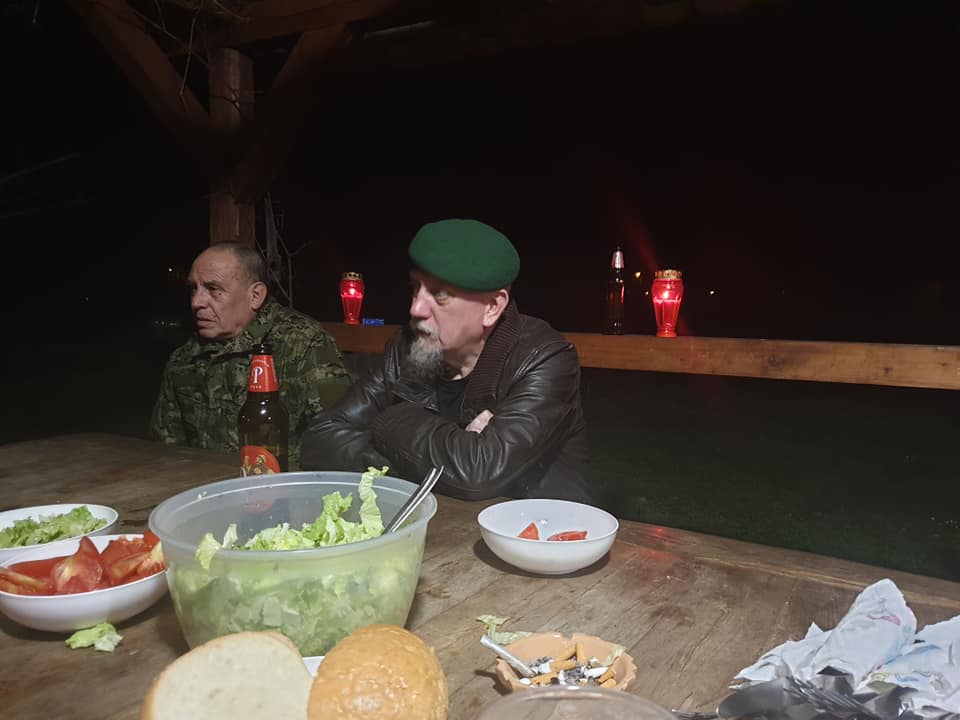
(Nigs Balchin at the November 18 barbecue where TCN first met him)
We decided to follow up the story with Nigs Balchin. Janja Sestak, one of our new TCN interns from Zagreb University, was doing a story for us from Krapina, and she met with Nigs to learn more of his story, which you can read in the interview below.
1. How did you first get involved in the war? Did you have a Croatian connection?
To be honest, I don't think I would have been able to point out Croatia, or Yugoslavia, on a map at the time. If I had to, I would have probably pointed it somewhere closer to the UK. No, I didn't have any previous connection with Croatia, but when I saw what was happening on the news, it was wrong, and I wanted to help. So I came over. I was 27 years old.
2. What was the extent of your previous military training?
I had a little military training but nothing much. I was a member of the TA (Territorial Army), but only on a temporary basis. I trained with the TA every Tuesday evening after work for 14 months.
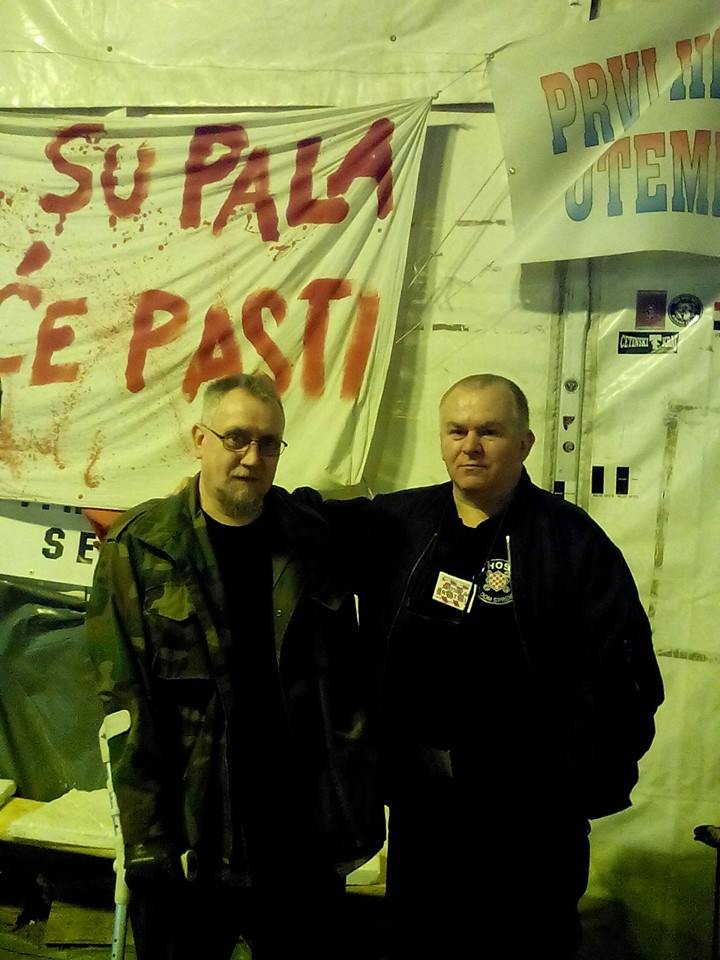
3. There has been a lot of talk about mercenaries fighting for Croatia. Were you a mercenary? Did you know of others who were?
No, I was not a mercenary. I did meet some who were, however, several of them between contracts.
4. Tell us how you found the unit you fought for, and where did you fight?
When I arrived at Pleso Airport, I was asked if I was here for business or pleasure.
"I came to volunteer." They let me pass, but I got no directions on where to go. In Zagreb, I tried to contact the army, but nobody knew about a division for foreigners. I was sent over to HOS (Croatian Defence Force, the paramilitary arm of the HSP party). There were three teenagers dressed in black in front of the large building, all armed with pistols. The taxi driver explained that I had come to volunteer.
"So you want to shoot Cetniks like John Wayne?" he asked me as he pulled his gun out and pointed right in front of my nose.
"Not with you, mate," and he turned around, called the taxi driver back and headed together to the train station. There he went in search of a policeman, as he thought he would get more reliable information. But information was conflicting, and he was told to go to Slavonski Brod, while a foreigner in front of him was told to go to Vukovar.
His first unit was an independent group called Bura in HVO 103 Brigade, in June 1992. He got a Kalashinkow, was told how to strip it, clean it, and reassemble it. He did that three or four times, and that was his training.
Next Monday at 7 a.m., they were out there, in front of their lines, leading a 200-foot line of soldiers around a hill. They had to meet tanks and armoured vehicles, which were going the other way around the hill. It didn’t work. It was nice and dry weather. One tank driver from Slavonski Brod realized that he should drive his tank over the field which had just been ploughed. If he did that, he would have to clean his tank. So rather than going across the field, he turned his tank and went back. When other tank drivers and commanders saw that one guy was turning back, all of them turned back. All of a sudden, there was no army on one side of the hill. Nigel and other soldier came from their side and found out they were all alone. Serbs start to shoot from the hill. Nigel and his division had to crawl back.When everybody came back, 25 names were missing. One tank caused 25 deaths. He was never accused for that. But Nigel met him in Slavonski Brod, among his people and yelled “Coward!” at him. He told him how he is responsible for the death of 25 people. He started arguing, but in the end, he couldn’t do anything but cry.
In Bosnia, we didn’t listen to their radio because it was all lies. We were listening to German radio, they told the truth. The Germans said on the radio there was an attempted attack by HVO forces and that there were so many killed and so many captured and other details. Serbs in Bosnia would give false information. “There were cases when we had actions in Domaljevac, and we would shoot Četniks with mortars. They would say on the radio that all of the victims were civilians, women and children. After a while, we would hear on the radio from Frankfurt that 3 Bosnian soldiers were killed and 2 wounded. Propaganda…”
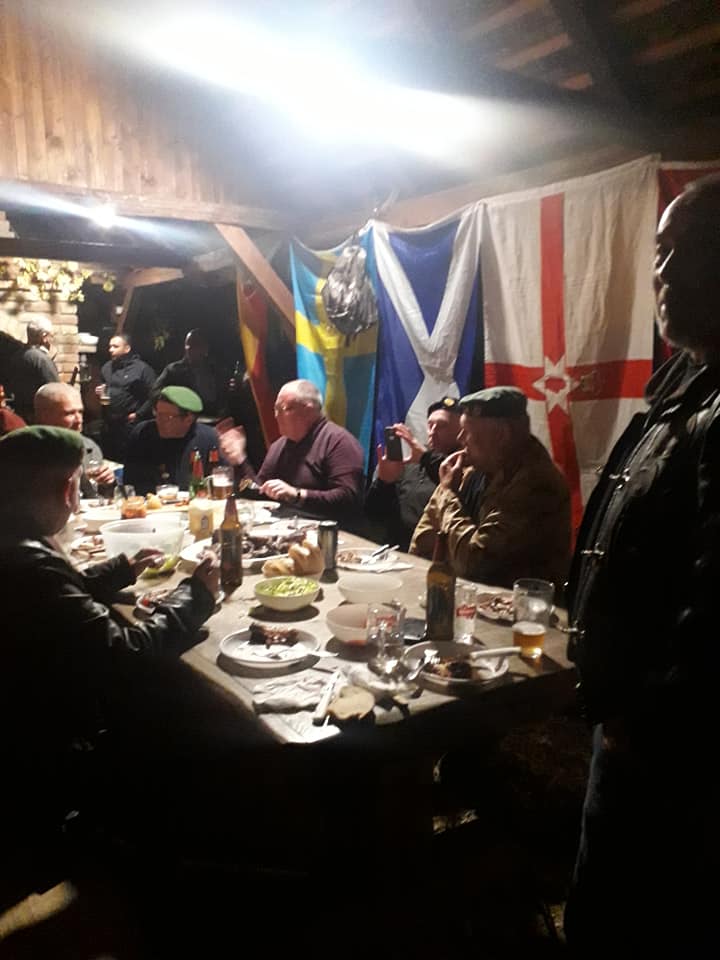
5. You were wounded during the war. Tell us what happened?
I was wounded five times, but they only accepted 4 officially. Four times in 103. Brigade Derventa, and once in 104. Brigade Bosanski Šamac. The first wound was after just two weeks. It was a dislocated ankle. As someone stole my boots and we had to jump from a decent height in one action, I dislocated my foot. I couldn’t walk, I was helping myself with a rifle, but I was constantly falling down.
The second injury was in Koraće, and I was knocked out, so I don’t remember it. 103rd and 101st Brigade, they both had a report of the incident, but they are completely different. 101st Brigade had that I was attacked by military police and beaten up by them. 103rd Brigade had said I was close to the explosion and being hit by debris. I had injuries on my shoulders, writs, all down my back.
The third injury was in Slavonski Brod with the shrapnel to the arm, elbow, chest, stomach. I was seven days in hospital. Six days they left the wounds open. I had a reputation in Slavonski Brod of disappearing. I lay there twice and that room was in the basement with just one light. I wanted a cigarette, but at the same time, one mortar bomb landed on the hospital. As if that was going to stop me. So I went out of my room, sat on the stairs, and lit a cigarette. And everybody went crazy like, where is the Englishman? I sat there, smoking a cigarette, watching a damage control team checking out what damage the mortar did to the wall. All of a sudden, there was a nurse behind me. She started to shout at me because I’m went missing. I was like: “I’m having a cigarette, would you mind? Every time I am missing, I’ll be here, having a cigarette.”
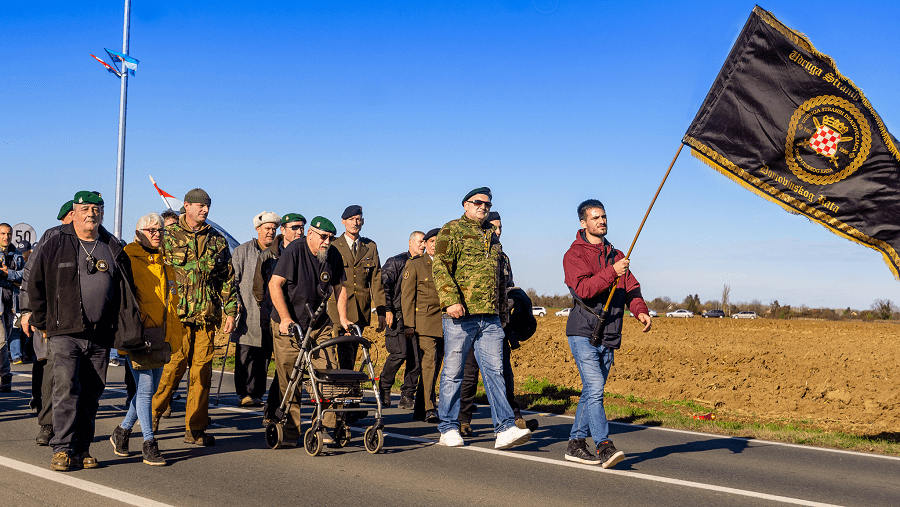
The treatment in hospital was very good, and I even got a marriage proposal at that time from a nurse. She was a nurse with whom everybody fell in love with. But she wanted to marry me and go to England with me. I was here for the war and told her we can get married, but I won’t go to England until the war is over. So the answer in that time had to be no. I didn’t want to mix emotions because I saw what it did to the people on the front line when they had a family right behind the front line.
The fourth injury were the eyes. For a few months, I was with 106th Brigade. My unit was in southern Hercegovina. We were in a small bunker with two huge slits and no chance for a fire. In the night, when temperature hits minus 20 degrees, you need some heat. We stuffed blankets in these slits, and then we could make a fire. But there was a risk of snipers… So as I was responsible for this fire, all of a sudden, it somehow exploded in my eyes. I couldn’t open my eyes, and I needed to be taken out of the bunker. As we got to the ambulance, they tried to check my eyes, but they couldn’t. I was sent to the Red Cross, then in Tolisa in Monastir. They checked my eyes but still couldn’t see if there was some damage. So they put me some big cotton bandage and sent me to Slavonski Brod where they did a bunch of tests. It turned out I just had to wait until burnings stop. Even today, I have a problem with the wind which causes me teary eyes.
The fifth wound was the left knee, and I got damage on the ligaments and nerves, but this one was not accepted.
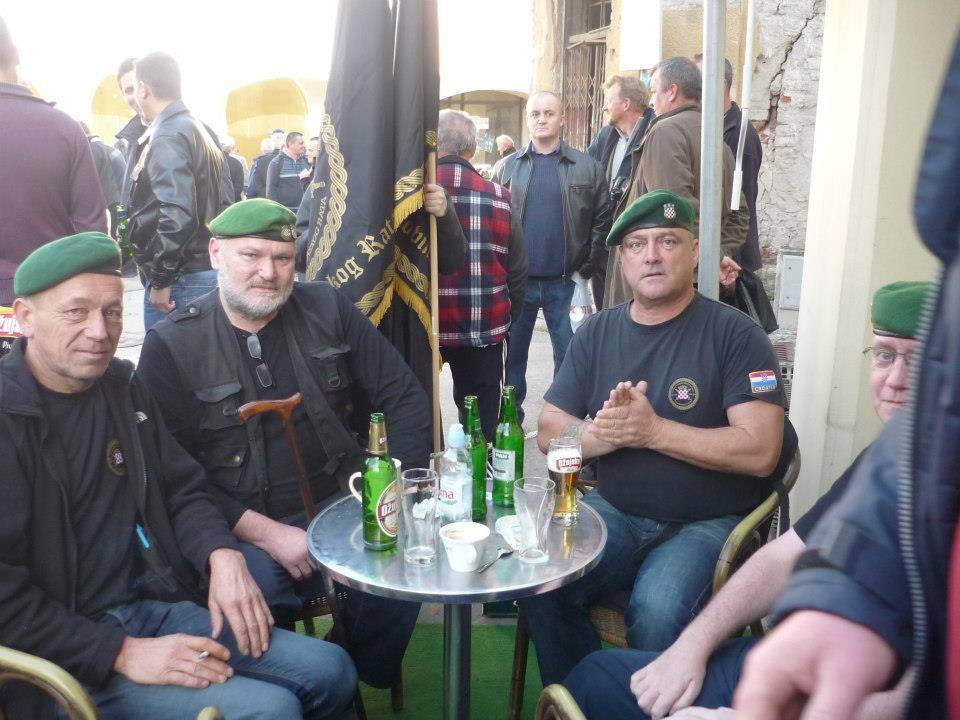
(Nigs Balchin, far right, with other foreign vets on Vukovar Remembrance Day 2019)
6. Moving to after the war, what compensation did you receive from the Croatian State?
I got a pension and citizenship in 1999, and a flat in 2007. The first commission gave me 70% invalidity, which was confirmed both from HVO and HV. In 1995, I was transferred from HVO to HV. Somebody in the Ministry of War Veterans (Ministarstvo branitelja) did that. I don’t even know who started the process for that. I just became a member of HV. But it was quite a disadvantage because in HVO I received HRK 2500 and in HV I got HRK 1400. I couldn’t survive with this amount of money for a whole month. I was like a tennis ball. They keep sending me from Zagreb to Orašje, then from Orašje to Zagreb. Since I was living in Đakovo, I had to pay rent, food, and other stuff. Constantly traveling to Zagreb cost me too much money, so I moved to Zagreb. I went to the military base Borongaj and stayed there in what they called “Sobe prolaza”. I was there for a few days nobody said anything. But then one officer saw me and asked me who I was. I told him and he gave documentation to this commander officer. Since I didn’t even know that I needed permission to be there (I did not have any), I had to left the base. I tried to ask the officer where can I get this permission, but officers just showed me the door and said: “Get out and never come back.”
He ended on the streets without any money and had nowhere to go. He knew nobody in Zagreb. Nigel spent a few nights on the streets.
Then Mario Kirin arranged some lodging at the Red Cross for him. He was in Sesvete for three months, but the money wouldn’t last for the whole month. One of his friends (Scottish) who in that time lived in Krapinske Toplice, had a word with Vojna skrb in Krapinske Toplice. They found him a place to sleep, eat meals in hospitals etc., almost like in base in Borongaj. So he moved in Krapinske Toplice and stayed there for five years and then moved to Krapina. He became a member of a baptist church in Krapina in 1998.
7. And what recognition of your sacrifice for the war effort?
One thing I learned very quickly when I came here is that there is no capitalist like a communist. I met them mostly in bureaucracy. A lot of people there still lived in the Yugoslavia dream. I especially had a bad experience in Vojna skrb, Ilica 210, who acted just like they were still in Yugoslavia. Their attitude was like I was there to serve them, not the other way around. The identical thing was in the workshops. Vojna skrb in Krapinske Toplice was 100% awesome. One woman who worked there (in Vojna skrb Krapinske Toplice) wrote to me on the paper exactly where I had to go, who I needed to search for etc. and gave this to me. I took this paper, went to Ilica 210, and said: “I’m looking for this person.” When I came to the person I was searching for, I gave him the paper with all of the information. But that woman told me: “No, no, no, I am not the person you need, I don’t know what are you talking about.” (She was, but she was too lazy to get this job done.) “You have to go to this place, the reason is well… Okay, but change it to this, and blablabla.”
I didn’t know the Croatian language well, so I kindly asked that woman to write me down where I have to go. But again, she was too lazy to do that, so instead of this, repeat these instructions on Croatian to an Englishman. Several times… When her boss arrived, she admitted with no shame what she had done.
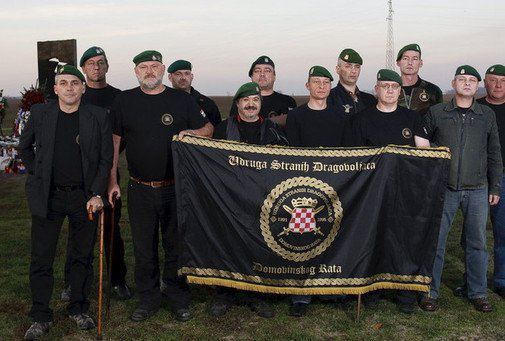
8. Your pension has been reduced in recent years - why?
I could say that I got recognition by the fact they looked at my case and decided to reduce my pension. That was the time of great revisions. Every year or two, they would revise war invalids (their percentages and their pensions) because there were a lot of fake war invalids. These fake invalids paid somebody to get a pension. I was going through the process at that time, and they reduced my invalidity by 60%. And then again to 50%. I was talking to the doctors in Krapinske Toplice, and they said I should get 80% or 90%. Then, when I got a pension, the Ministry of Defence didn’t want to sign my paper. They reduce my invalidity to 55% so they could say to the others: “Look! We don’t pay them as much as you think!” They did it because I am a foreign, with no influence friends or family here. They literally cut my pension and gave it to the fake war invalids. So I ended up with 50% invalidity and a small amount of pension. I was again on HRK 2500.
9. As your pension is reduced, the number of war veterans increases every year, now over 500,000 - how do you feel about that?
I am not angry or frustrated, I am just sad that people with fake invalidity exist.
10. Tell us about your efforts to reassess your pension.
Every war invalid has a right to apply every six months to have his invalidity reassessed. I started asking around what I need to do, but apparently, nobody knew. It took me six months to gather all of what I needed. When I made an application for invalidity reassessment, they told me that I needed to give them everything from that day up to now. All documents from 1992 to this day. With the help of Mario Kirin, I wrote a complaint letter and handed it to the Upravni sud court in Zagreb. It took them two years, and during those two years, no alternation in status was permitted. For those 2 years, I was stuck on HRK 1400. It came out that they found out that the medical commission didn’t consider the evidence objectively. They found out that the percentage was too low, and it needed to be revised immediately. So, I handed out that to the Ministry, and they sent it to the medical commission for the new assessment. What they did was they removed diagnoses. I had 14-15 diagnoses in the beginning, and they removed 3 or 4 and gave me 50% of invalidity, but this time permanently. I realized that working out with the Ministry of Defence is like working with mafia.
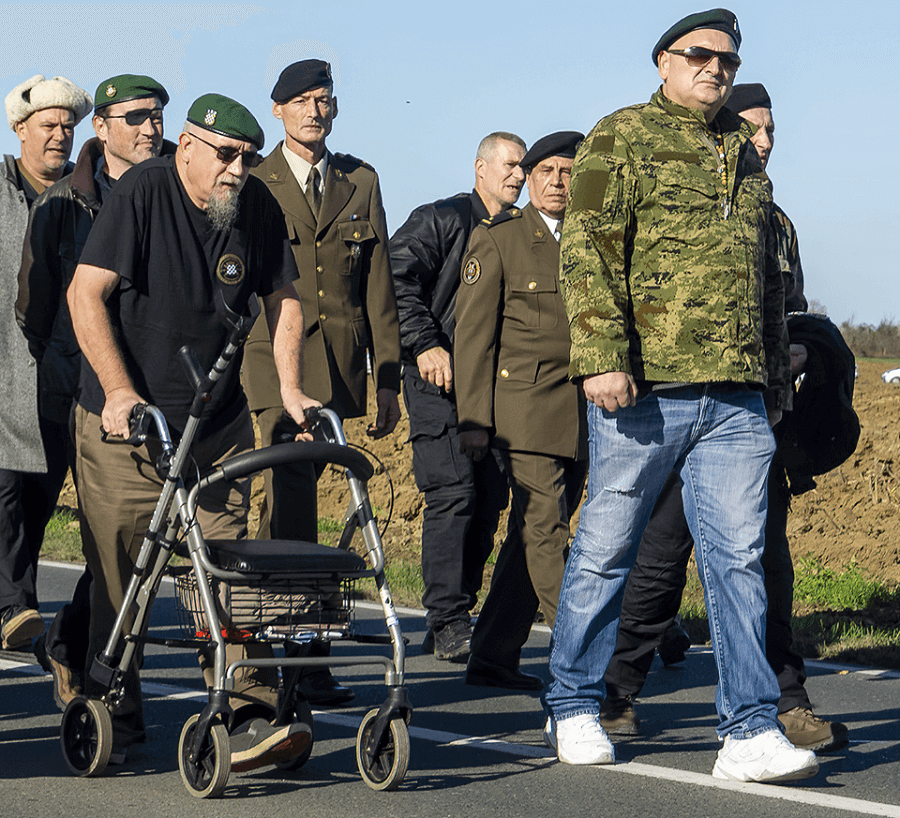
11. You applied for 10% extra based on your PTSD, too. How did that go?
Yes, in 2001, I made an application for 10% extra for invalidity based on PTSD. I got a message that I had to revoke that application, or I would lose everything. My pension, my citizenship, and I would be kicked out of the country by the Ministry of Defence. Everybody who I knew and who I contacted about this problem, said to me: “Revoke it. They are too powerful. There is nothing you can do.” I got a friend to come with me to the office for war veterans as a witness. There was a woman who said to us that is entirely true. She went to the other room, came back 30 seconds later with the printed version of my revoking statement, and all I had to do was signed it. She didn’t have to type anything. It was ready for me to walk in. I just signed it, and that was it.
12. Looking back, almost 30 years later, what are your reflections on what you fought for. Would you do it again?
I have no regrets about coming, I would do it all again. I don’t consider or look at most Croats in the same way as the bad ones. The bad ones are a small percentage of Croatia, but unfortunately, a percentage with the possibility to harm me. However, if it weren’t for the good ones, I wouldn’t survive the bad ones.
Ministry of Interior to Spend 5.9 Billion Kuna in 2020
ZAGREB, January 22, 2020 - The Ministry of the Interior on Wednesday presented its financial plan for this year, worth 5.9 billion kuna, and signed about 30 contracts with domestic companies which will deliver their products to police and civil protection forces this year.
The financial plan is 228.3 million kuna or 4% higher than last year, it was said at the presentation.
The increase refers mostly to salary expenditures, funds for Croatia's EU presidency and the procurement of police equipment.
Assistant Minister Cvjetko Obradović warned about a decrease in the share of salary expenditures in the ministry budget.
"Salaries accounted for as much as 76% of the ministry budget in the previous period, last year they accounted for 66.13% and this year they are expected to account for 65.69%," he said.
Obradović said that the ministry's priorities included raising the quality of accommodation for police officers, energy renovation of buildings used by police and raising the quality of police work.
1.6 billion kuna of the 2020 ministry budget is intended for public procurement, mostly of equipment for police and civil protection units, mine removal and road safety.
Minister of the Interior Davor Božinović signed contracts with some 30 domestic companies for the procurement of equipment for police and civil protection units, equipment for EU presidency, equipment envisaged by EU projects, and mine removal. The total value of the contracts exceeds 289 million kuna.
More news about Interior Ministry can be found in the Politics section.
Conflict of Interest Commission to Check Health Minister's Declaration of Assets
ZAGREB, January 22, 2020 - The Conflict of Interest Commission will inspect the information registered on the Declaration of Assets submitted by Health Minister Milan Kujundžić following media reports about his purchase of a house in Zagreb and its value.
"The Commission will launch a procedure to check the information on Minister Kujundžić's declaration of assets and compare that with information that it will request from the authorised institutions - Tax Administration, Land Titles Department and so on," a spokeswoman for the commission, Martina Jurišić told Hina.
If any discrepancy is identified, the commission will request the official to submit his explanation and after that the commission will decide whether there are any grounds to launch proceedings, Jurišić added.
The Telegram news portal reported that Kujundžić registered a lower value for the house he is currently living in than is realistic.
The minister claims that the house is valued at 900,000 kuna even though a loan agreement that the Kujundžić's signed with the PBZ bank in 2010 estimated the value of the house at 2.37 million kuna and later when the loan was rescheduled, the property was appraised at 1.68 million kuna.
Kujundžić did not wish to comment on the Telegram article but said that everything was clear and transparent regarding his house and that he would inform the commission of everything when he is requested to do so.
"I'm obliged by law to answer to the commission, however, there is nothing to hide here, everything is transparent and clear. It is easy to check and see how much my wife and I earned in the past five years, just as it can be seen in my account that my savings increased by 7,000 kuna to 8,000 kuna each month," Kujundžić told Hina.
Telegram on Tuesday reported that Kujundžić's family bought another house in Zagreb late last year, which is owned by his wife Tatjana and that she paid 1.46 million kuna for the property located in the Zagreb suburb of Maksimir. The article however notes that it is not clear from Kujundžić's declaration of assets where the money to purchase that real estate came from.
Kujundžić reacted saying that the transaction was transparent and lawful and that he had informed the commission of the purchase.
Kujundžić noted that the house is estimated at 195,000 euro and that he and his wife bought the house with a loan of 100,000 euro with the PBZ bank, 55,000 euro of their savings at the PBZ bank and 40,000 euro that he borrowed from friends of theirs for which he signed an agreement that was certified by a public notary and that that money was paid directly into the seller's account.
Prime Minister Andrej Plenković, who is currently attending the World Economic Forum in Davos, commented briefly on the entire case and said that he would meet and talk with Kujundžić on Thursday.
"I can't much comment, I believe that he will explain everything," said Plenković.
More news about conflict of interest issues can be found in the Politics section.
Euro 2020: Croatia Handball Team 2nd in Group after Draw with Spain
January 22, 2020 - The Croatia handball team met Spain for their final game of the second round in the European Championships in Vienna. The meeting was crucial to determine first place in the group, and thus Croatia’s semifinal opponent.
Croatia could not count on Luka Cindric for this game, who has been one of their best players of the tournament thus far.
Spain had the first attack of the game, which they scored for 0:1 in the 38th second. Croatia was unsuccessful in its first attack.
Stepancic, however, equalized in the 2nd minute for 1:1. Karacic made it 2:2 in the 3rd minute, scored again for 3:3 in the 5th minute, and made it 4:4 in the 6th.
Karacic continued with his brilliance to make it 5:5 in the 9th minute. Croatia and Spain were going-for-goal.
Croatia took the lead for the first time in the game thanks to a Mamic goal in the 12th minute for 6:5.
Stepancic made it 7:6 in the 17th minute, and Sipic scored to increase Croatia’s lead to 8:6 in the 19th minute. Sego was brilliant in goal.
At this point in the game, there hadn’t been a goal for over three minutes.
Karacic scored his fifth goal of the game for 9:7 in the 23rd minute.
Horvat scored a 7-meter shot for 10:8 in the 24th minute.
Spain equalized in the 25th minute for 10:10.
Croatia retook the lead in the 26th minute for 11:10 thanks to Karacic once again, though it was Spain to regain their lead one minute before the half for 11:12.
Spain increased its lead at the start of the second half for 11:13, and they were up by three goals in the 33rd minute (11:14). It was 11:15 for Spain in the 35th.
Karacic scored his seventh goal of the game to make it 12:15 - but in the 37th minute, it was 12:17... and in the 39th, 12:18.
Duvnjak scored a 7-meter shot for 13:18 and Brozovic scored in the 41st for 14:19.
Karacic reduced Croatia's deficit back to -5 for 15:20 in the 46th minute. Sipic made it 16:20 in the 47th minute, and 17:21 in the 48th.
Karacic scored for -3 and 18:21 in the 50th minute, and scored his 10th goal of the game in the 52nd for 19:21!
Croatia was well on its way to a comeback and Horvat scored for 20:21 in the 53rd minute.
Mamic scored the equalizer for 21:21 with five minutes to go!
Duvnjak scored a rocket in the 58th minute to give Croatia the lead (22:21).
Spain was given a 7-meter shot in the 58th minute, though Asanin was unable to make the save. Spain equalized for 22:22, which was the final score of the game.
Igor Karacic was named the man of the match.
To read more about sport in Croatia, follow TCN’s dedicated page.
Zagreb Mayor Bandić Pleads Not Guilty to Waste Management Irregularities
ZAGREB, January 22, 2020 - Zagreb mayor Milan Bandić appeared before County Court on Wednesday morning and pleaded not guilty to irregularities relating to waste management.
Also accused are the owner of the CIOS waste management company, Petar Pripuz, and another 15 defendants. They all pleaded not guilty to charges that the City had awarded the job of waste disposal to CIOS without a tender.
The trial was watched by civil society activists, including Dario Juričan, who recently ran in the presidential campaign and publicly criticised Bandić for corruption.
A group of activists met Bandić outside the courthouse, booing at him and calling him a thief. They brought him a gift for prison: a toothbrush, a towel with his name, a bar of soap, a roll of toilet paper and a bag of mandarins.
Activist Gordana Pasanec of the Siget civil society group said the group wanted the court to finally pass a final and fair judgment. "It's impossible that he is never found guilty. It is disgraceful that witness testimonies and indictments are constantly changed because of somebody's interests," she said, adding that citizens would show today that they were fed up with bribery and corruption.
The anti-corruption investigating agency USKOK submitted the indictment against the mayor of Zagreb and his associates and business partners to the court back in December 2015. Seven counts of the indictment were upheld by the court in March 2018 and three were returned to the prosecution for completion.
In late March 2019 the Zagreb County Court suspended proceedings against Bandić in the part of the indictment that charged him with defrauding the budget by not paying taxes on donations he had received after the 2010 presidential elections.
At the end of October 2019, the court upheld the part of the indictment against Bandić and Pripuz relating to waste management.
More news about Milan Bandić can be found in the Politics section.
Grabar-Kitarović Defends Three Seas Initiative
ZAGREB, January 22, 2020 - Outgoing Croatian President Kolinda Grabar-Kitarović said on Wednesday that the Three Seas Initiative, as one of the most important initiatives in Europe and the European Union, was important for Croatia, calling on her successor, Zoran Milanović, to support Croatia's participation in it.
Grabar-Kitarović was speaking at a panel called: "Growing Europe: The Economic Vitality of Central and Eastern Europe", organised on the margins of the World Economic Forum in the Swiss ski resort of Davos by the Atlantic Council, Goldman Sachs and the largest Polish insurance group PZU.
In her address, she presented the Three Seas Initiative which she had launched together with Polish President Andrzej Duda. She said that the initiative is aimed at "strengthening this part of the European Union and ensuring that our citizens enjoy the same living conditions as exist in other European countries."
Asked by the press about the questionable support for the Three Seas Initiative of President-elect Zoran Milanović, Grabar-Kitarović said that it was his decision, but that she would recommend to him to support this initiative.
"As for the President-elect, it is up to him to decide whether he will participate or not. I would certainly recommend to him to participate. However, I believe that Croatia will not withdraw from the initiative because it is not just at the presidential level but also at many other levels, including the prime minister, relevant ministries and business," Grabar-Kitarović said.
The panel also involved Polish President Duda and Latvian President Egils Levits.
In her speech, Grabar-Kitarović noted that the European Union was still a community of differences in levels of development between its north and south, east and west, adding that this was due to the circumstances in which the countries of Central Europe had found themselves during several decades of the 20th century.
"During this period, they were hindered or delayed in developing their potentials and were disjoined from modern European economic and political democratic trends," the president said, adding that the consequences of this are most evident in the lack of infrastructure networks in energy, transport and telecommunications – areas that underpin Europe’s growth and development.
Grabar-Kitarović said that with its three main pillars – transport, energy and digitisation – the Three Seas Initiative aims to overcome Europe’s uneven development and contribute to the cohesion of the EU.
Noting that at its core, the Initiative is aimed at the prosperity of the entire European Union, the President remarked that this is especially relevant for the energy independence and security, economic, social and territorial cohesion, as well as the overall resilience of the European Union to the various challenges being faced on the global level.
"Ultimately, the development and prosperity of the countries of Central Europe is bound to have a positive impact in the political arena, as it will strengthen the cooperation among Central European nations and steer them in the direction of greater economic, cultural and other cohesion," Grabar-Kitarović underscored.
She went on to say that Central Europe represents one of the fastest growing EU regions and said she is convinced that with its goals, continued development and supporting deliverables of the summits in Dubrovnik, Warsaw, Bucharest, and Ljubljana, the Three Sees Initiative will boost this success even more.
She added that the participation of the United States and Germany, as partner countries of the Initiative, and the support of the European Commission, but also of the financial institutions – the European Bank for Reconstruction and Development, the European Investment Bank and the World Bank – has reaffirmed the commitment of everyone involved to the economic development of Central Europe, with a view to reaching the real convergence of the economies of the Initiative countries with the western part of the EU.
"In addition to political challenges that threaten the unity of the European Union – at this moment, Central Europe could be seen as a beacon of commitment to the European idea. It is the idea of cohesion, consolidation, prosperity and a fully integrated and functional internal market, making the European Union more resilient globally," Grabar-Kitarović said.
In conclusion, she said that in the context of EU membership Croatia has two more goals to fulfil: entry into the Eurozone and the Schengen Area.
"Our objective is to join the European Exchange Rate Mechanism in the first half of this year, during Croatia’s Presidency of the EU Council. Becoming part of the Schengen Area is of great importance for the security of not just Croatia but the entire European Union," Grabar-Kitarović said.
After the panel, Grabar-Kitarović has left for Jerusalem to attend the World Holocaust Forum. Among those attending will be French President Emmanuel Macron and Russian President Vladimir Putin.
More news about Kolinda Grabar-Kitarović can be found in the Politics section.
Plenković: Talks in Davos Very Useful
ZAGREB, January 22, 2020 - Croatian Prime Minister Andrej Plenković said on Wednesday that the talks he held at the World Economic Forum (WEF) in Davos were very useful for the strengthening of bilateral relations as well as for the positioning of Croatia on the global scene in the context of its current EU presidency.
"Yesterday and today we held a number of meetings... the talks in Davos were very useful, in terms of bilateral relations, our role regarding various topics and dossiers that are important for them in the context of Croatia's EU presidency and generally for our positioning in forums like this one," Plenković told Croatian reporters in Davos.
The Croatian PM on Tuesday attended two panels and held talks with a number of political officials and business people, and on Wednesday he met with French Economy and Finance Minister Bruno La Maire.
Before that meeting, he took part in the informal meeting "An ascendant Europe" on the topic of Europe's future, "the strengthening of its position and its role as one of the main stakeholders in global trade."
Plenković said that it was noted that the EU had to show leadership in global governance and do things that were in the interest of its companies and citizens, while taking into account social responsibility.
An overarching topic of the 50th World Economic Forum is social responsibility. The forum must take into account challenges such as climate change and topics that Croatia imposed in the European Council, such as the issue of demography and emigration of people from rural areas to urban ones and from less developed to more developed member states, said Plenković.
These topics were adopted in discussions held this year, which was not the case last year, said Plenković.
More politics news can be found in the dedicated section.

